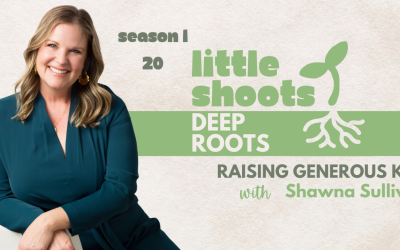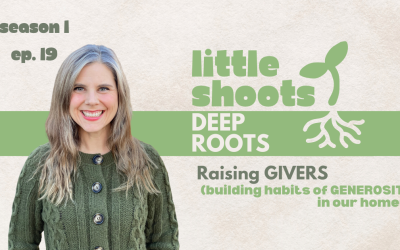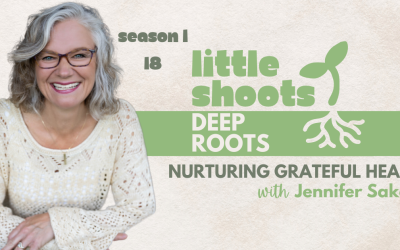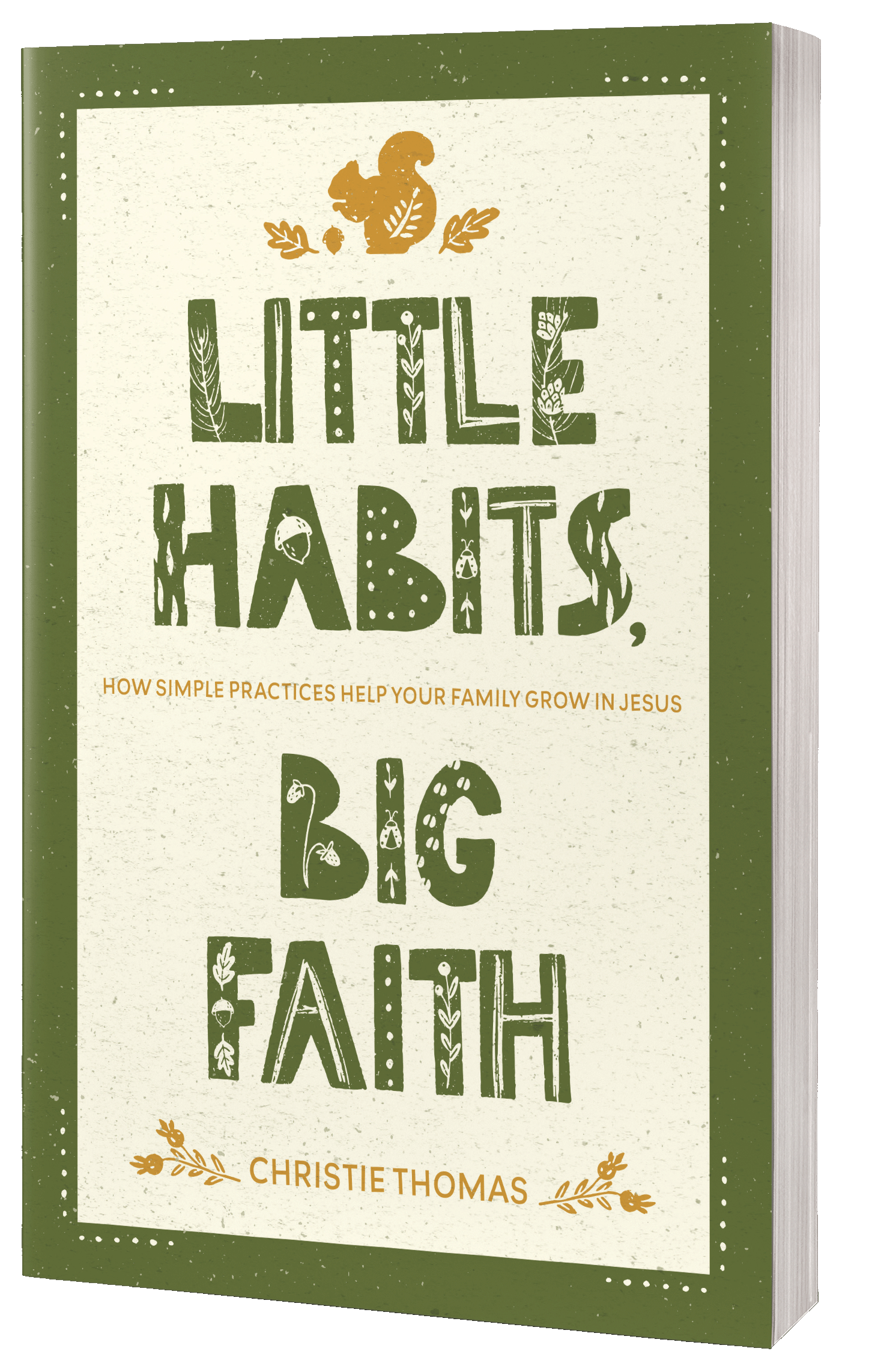In today’s busy world, is it realistically possible to regularly take a true, rejuvenating rest?
If you feel stuck in the constant churn of parenting, work, and activities, this episode is your gentle invitation to pause, breathe, and discover how making room for rest is not only possible, but transformative.
📚 Read LITTLE HABITS, BIG FAITH
Subscribe on your favorite listening platform for practical tips, real parent interviews, and encouragement as we become faith gardeners together!

📝TRANSCRIPT
Throughout university, I wasn’t very good at rest. When I first started dating my now-husband, he was shocked that I never really took time off from studying. It’s not that I didn’t like time off, but being busy was such a habit for me that I didn’t really think about it. I can’t remember if I stopped on Sundays…probably at least for a few hours after church, but for the most part I enjoyed my studies and was motivated to do well, so I kept myself pretty busy with it.
Then, as a parent, that desire to keep busy was not just a given because of the constant effort required in raising children, but celebrated. In our busy culture, rest isn’t something like we like to boast about. Have you ever answered the question “how are you?” With the answer “I’m well-rested, thanks.” Honestly, in our culture, rest is a gift we’re not very good at receiving. As parents, we’re always on the go—snacks, sports, school drop-offs, church, repeat. But God built rest into the rhythm of creation.
What does it look like to reclaim that rhythm in our homes? I’ll be honest, this is something I’m still learning. A few years ago I started putting down my work from Saturday evening until Sunday evening, but it doesn’t always feel like true rest. And our family hasn’t found a perfect Sabbath rhythm, aside from attending church on Sunday mornings.
But I’m learning that rest isn’t about a perfect day—it’s about making space for God, for each other, and for our own hearts to breathe.
My Sabbath Story
When I was a kid, Sundays were for quiet. We’d come home from church, eat a big meal, and then… stop. No shopping. No errands. For as long as I could remember, I was sent to my room to take a nap. I definitely remember reading books instead and feeling like I was being so rebellious. Pretty sure my parents just wanted to rest in peace! Once, I snuck downstairs and discovered they were watching a tv show…turns out, watching McGyver was their Sunday habit while their daughters “napped”. However, there was a hush to those afternoons, a kind of peace I didn’t appreciate until I got older.
As I grew, my dad was quick to remind me that Sundays were not for school work, which you can see has played out in my current practice of setting down my work from Saturday evening until Sunday evening. But as I grew, I found that I itched to DO SOMETHING on Sundays, not just sit around. The first time I mowed the lawn on Sunday, my dad was not impressed, but to me, it was so relaxing. It was so different from my normal routine that it felt like rest.
Those early experiences planted something in me. And as an adult, I’ve been trying (imperfectly) to make room for Sabbath in my own life and bring it into our family life as well.
Sabbath As A Gift
In Genesis, God finishes His work and then… rests. And that rest becomes part of the created order, woven into the world like gravity. In fact, the very first day after the creation of humans is a day of rest! Their first day was a rest! How’s that for a good start to life?
Later, in Exodus, Sabbath becomes one of the 10 commandments. God gives his new nation of former slaves a living lesson about Sabbath when He tells them to collect double manna the day before, then doesn’t provide the manna on the Sabbath…40 years of being forced to stop striving on the Sabbath would re-wire anyone’s habits! But Jesus shows us that Sabbath isn’t just a rule—it’s a gift.
Mark chapter 2 records the Sabbath day when Jesus was walking through some grainfields and his disciples began breaking off heads of grain to eat. Some Pharisees said to Jesus, “Look, why are they breaking the law by harvesting grain on the Sabbath?”
Jesus gave an example from the Old Testament about David breaking a religious law in a time of great need, showing that “human need is basic to God’s concerns.” Asbury Bible Commentary Copyright © 1992 by The Zondervan Corporation.
Then Jesus said them, “The Sabbath was made to meet the needs of people, and not people to meet the requirements of the Sabbath.So the Son of Man is Lord, even over the Sabbath!”
- God gave Sabbath because He knows we need it. Our kids need it too—even if they don’t know how to ask for it.
What Sabbath Looks Like for Me Now
I don’t always get it right, but I try to carve out sacred space in those hours from Saturday evening until Sunday after dinner. Sometimes it’s turning off my phone for a few hours. Or choosing not to work on Sundays, even when the to-do list is long. Or taking a family walk.
There are many different ways to observe the Sabbath, and it doesn’t have to be on Sunday. Back when I was working as the Children’s Ministries director, I would take Monday as a rest day, although I can’t say I really rested or treated it like a Sabbath. I just didn’t plan anything for those days.
Author Eryn Lynum and her family take a family Sabbath from Friday evening until Saturday evening, because they don’t feel that getting their family ready for church and doing all the Sunday things really qualifies as rest.
My pastor has young kids and his family also takes Sabbath rest from Friday evening until Saturday evening. This definitely makes sense for families in ministry.
Speaking of my pastor, last year he did a series on rest, and he gave us this great paradigm for what true rest entails:
First, he said, we need to STOP. Stop striving, stop doing, stop trying to do it on our own.
Then we REST. But we don’t stop there. We also need to make room for DELIGHT, which means doing things that bring us joy. And finally, we want to make room for CONTEMPLATION of God’s goodness. The best kind of rest comes from being with God.
Resting, taking a Sabbath, whatever you want to call it, please remember that you don’t have to do everything. You don’t have to ‘Sabbath perfectly.’ Just start by choosing one thing to set aside, and one thing to lean into.
Habits of Rest for Families
So let’s talk about some practical ideas for Sabbath rhythms that you could try in your weekly or daily life, as a seasonal rhythm, or as a habit you turn to when you feel extra rest-deprived.
Regular Rhythms (weekly or daily moments of pause)
- A lot of people use Sundays as a prep time for the week, but is there an afternoon that you could set said aside a “no plan zone”? No planning, no prepping, just Stop, Rest, Delight, and Contemplate.
- Eat a simple, slow meal together (pancake dinners or build-your-own sandwich)
- Light a candle before dinner to mark the start of rest
- Set aside personal devices for a weekly or daily pause
Seasonal Rhythms (once a month or tied to the calendar)
- Declare a “family Sabbath day” each school break—no chores, just fun and slowness
- Sabbath-themed Advent Sunday: candles, rest, reflective questions
Occasional Moments (when you feel rest-deprived or burnt out)
- Call a “Soul Day”: everyone unplugs, rests, and does something nourishing
- Let your kids choose one restful, creative thing for the whole family to do (read-aloud, slow baking, backyard stargazing)
I encourage you to involve your kids in shaping these rhythms. I’ve tried to enforce things like “no screens” or “taking a family walk” together, but as my kids grow up, I’ve realized I need to get family buy-in for anything we want to try. A couple weeks ago we had a conversation in the car about what our Sunday afternoons could look like, and I think what we landed on will last longer and be more restful than anything I would have tried to enforce on my own.
Final Encouragement
You don’t have to master these rhythms of rest.
You just have to make space for it.
Start small. Protect a window of quiet. Declare a screen-free hour. Go for a family walk with no agenda. Make space for God to fill with peace.
Remember, we don’t need to know it all or do it all in order to see changes in our family. We just need to take one small step at a time. Start with one small tweak, and see what happens! If it works, great, feel free to add to it. If it doesn’t work, try something else!
If you want to incorporate Sabbath rest or any other faith habit into your family in a simple and sustainable way, make sure to grab a copy of my book, “Little Habits, Big Faith: How Simple Practices Help Your Family Grow in Jesus”. It will help you make changes in a sustainable way.
Coming Up Next
In the next episode, I’ll be talking with Eryn Lynum, who I mentioned earlier. She runs the top-rated science and faith podcast for kids called “Nat Theo” and has recently written a Bible study book for adults on the topic of Sabbath.
Closing Blessing
Let me pray a blessing over you. If you’re able, hold out your hands to receive it:
May you and your family discover the gift of rest—not as another thing to achieve, but as a breath of fresh grace in your week. In Jesus’ name, amen.
Thanks for joining me here at Little Shoots, Deep Roots. If you’ve enjoyed this podcast, I’d love if you’d take a minute to leave a rating or review. And even better, share this podcast with a friend!
Growing with you,
Christie









0 Comments